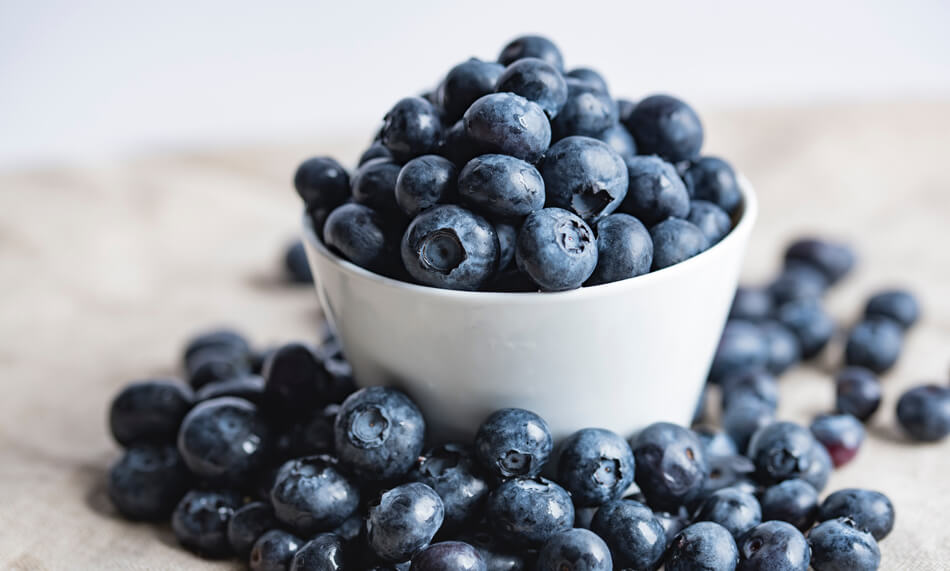Are Blueberries Good for Diabetes? Know This Before Eating Them
When dealing with diabetes, you have to be cautious of what you eat. Eating the wrong thing may raise your blood sugar too high, leading to serious health concerns. Where do blueberries fall on the diabetes care scale?

One of the main questions many have is about fruits that are acceptable to add to a diet to treat diabetes. One fruit you may be wondering about is blueberry. This fruit is packed with nutrients and antioxidants.
These are things many people are looking for to be healthier in their lives. Even with its sweetness, though, it has been shown to actually help with blood sugar levels, heart health, and a wealth of other health benefits.
In this article, we’re going to answer the question, “are blueberries good for diabetes?” By looking at the effect of this small fruit on blood sugar and nutritional and glycemic metrics, we hope to answer this question thoroughly.
Are Blueberries Good for Diabetes?
Yes! Blueberries are a fantastic superfood for those with diabetes. This is because they are packed with a wide range of vitamins and minerals and are high in fiber.
The antioxidants in this fruit have also been shown to help prevent many diseases. When it comes to individuals with diabetes, this small but mighty fruit has other benefits that can help quench the symptoms of the disease. Blueberries have been shown to help with glucose processing and insulin sensitivity.
Along with this, because of their high nutritional value, they can also be helpful when it comes to weight management. All of this combined means that this tasty and sweet fruit is a great way for people with diabetes to get their antioxidants and sweetness in one place.
Do Blueberries Raise Blood Sugar?
When looking at fruits and berries, you’re dealing with natural sugars. Each of these fruits has different levels, and because of this, some fruits impact blood glucose levels. But a healthy balanced diet is as important for those with diabetes as everyone else, and losing access to certain pieces of fresh fruit can be detrimental.
However, when it comes to blueberries, they do not affect your blood sugar levels. This means they make excellent additions to any meals as well as snacks. Part of this is because your body utilizes carbohydrates from the food you eat to create glucose. Once the glucose is created, it’s then delivered into your cells, and having too much glucose can create high blood glucose levels.
Even a cup of blueberries only contains a minimal amount of carbohydrates and even fewer sugars. This, coupled with the fact that blueberries are high in fiber, allows for a minimal effect on a person’s glucose level.
Nutritional Value of Blueberries
Understanding the nutritional value can be important for those who consume blueberries in their diet. When looking at half a cup serving of fresh blueberries, you will find that they have the following nutritional values:

Glycemic Index of Blueberries
Blueberries have a 53 ranking regarding the GI, which is one of the lowest. When it comes to the GI, one has to understand another factor: the glycemic load. This is determined by the size of the portions and the carbohydrate count of the food.
Just one cup of blueberries has a glycemic load of 9.6, making it a great option for those working with diabetes.
The GI or the glycemic index measures the effects foods with carbohydrates have on the blood sugar level in one’s body. This metric operates on a zero to 100 ranking system where foods with a higher GI are more likely to raise blood glucose in the body. Ideally, those with diabetes want a lower glycemic index.
5 Benefits of Blueberries for Diabetes
Though there are many benefits to your overall health regarding diabetes and metabolic syndrome, blueberry consumption has more amazing benefits, including managing one’s body weight.
Below, we’re going to talk about five major benefits one can take advantage of when they choose to eat blueberries:
#1 Rich in vitamin C
Vitamin C is an antioxidant that can help reduce and fight damage caused by free radicals in our system. Because of this, it is important to those with diabetes because it can help protect the cells from even further damage.
Along with this, vitamin C is also known to help lower blood sugar and reduce the chance of spiking after meals. Vitamin C is also paramount in helping heart health by protecting core systems from damage caused by those free radicals mentioned above.
#2 Reduce high blood pressure
Blueberries can help alleviate some cardiovascular risk factors like high blood pressure, thanks to their high antioxidants and mineral and vitamin count. Oftentimes, because systems aren’t working properly for those dealing with diabetes, other health risks begin to appear.
However, these blueberries are rich in something called flavonoids. It has been proven that these natural compounds in blueberries can help with hypertension and lowering blood pressure.
#3 Maintain healthy digestion
Being able to process glucose and help improve insulin sensitivity can help with healthy digestion. Blueberries are actually one of the fruits that are high in fiber.
The dietary fiber present in these will help improve digestive health, leading to other amazing benefits like elevated levels in weight management.
#4 Enhance brain function
Fresh or even frozen blueberries will have high levels of antioxidants, as we’ve said before. The brain often suffers from damage as it ages and is exposed to more free radicals, leading to cell damage and protein glycation.
These antioxidants, because they protect from that, will improve the health of your brain and, therefore, your brain’s functions. It has been proven that these fruits accompanied with a healthy balanced diet can help improve memory and focus as well as combat the effects of aging.
#5 Aid in weight loss
When dealing with diabetes, one of the biggest challenges is maintaining weight. A healthy weight loss management system can be vital to decreasing certain disease symptoms. Blueberries are very dense in nutrients and low in calories, so they can be more filling and not add calories to your diet.
The best thing for those dealing with diabetes is to have a healthy diet, which should include fruits and other products like blueberries. The fruit has a high level of fiber, which helps keep digestive health going and aids in weight loss.
FAQs
When it comes to diabetes management, sugar intake is vital. Blueberries, though a fruit, do not have a high sugar count (just under 7g of sugar, to be exact, for 75g). In fact, many studies show blueberries improve insulin sensitivity, which is key when dealing with the symptoms of diabetes.
When you’re looking to maintain a good blood sugar level, it’s important to understand portion control. This is because those with diabetes have high insulin resistance. When it comes to blueberries and portion control, most suggest that it is OK for an individual to have a cup of blueberries, whether fresh or frozen.
Blueberries are high in antioxidants and rich in minerals and can help improve insulin resistance but can’t cure diabetes. However, utilizing them in a balanced and healthy diet can help you improve your overall health and reduce many common health issues and symptoms for those who deal with diabetes.
A Word From a Nutritionist
Blueberries are one of the best ways to get vitamins, minerals, and antioxidants without spiking your blood sugar levels. Of course, eating a balanced and healthy diet benefits anyone, whether dealing with diabetes or other health issues.
But incorporating foods like blueberries, which are high in fiber and rich in antioxidant minerals, can help you achieve better weight management and improve physical and mental health.
Blueberries are rich in all of these and offer a wealth of benefits, including promoting better blood sugar responses in one’s body and maintaining blood glucose levels. These superfoods can be utilized in many ways, including a blueberry smoothie or salads.
Finding unique ways to incorporate them will allow you to garner the benefits and help relieve some of the stress on your body caused by diabetes.
Conclusion
With the correct portion size, blueberries are great for individuals with diabetes due to the makeup of antioxidants, rich minerals, and fiber. These berries have many benefits that are directly related to helping reduce symptoms and reverse damage caused by diabetes.
They reduce the number of free radicals found in the body while increasing your fiber consumption, which is vital for healthy digestive processes.

















































 Select your language:
Select your language: 








